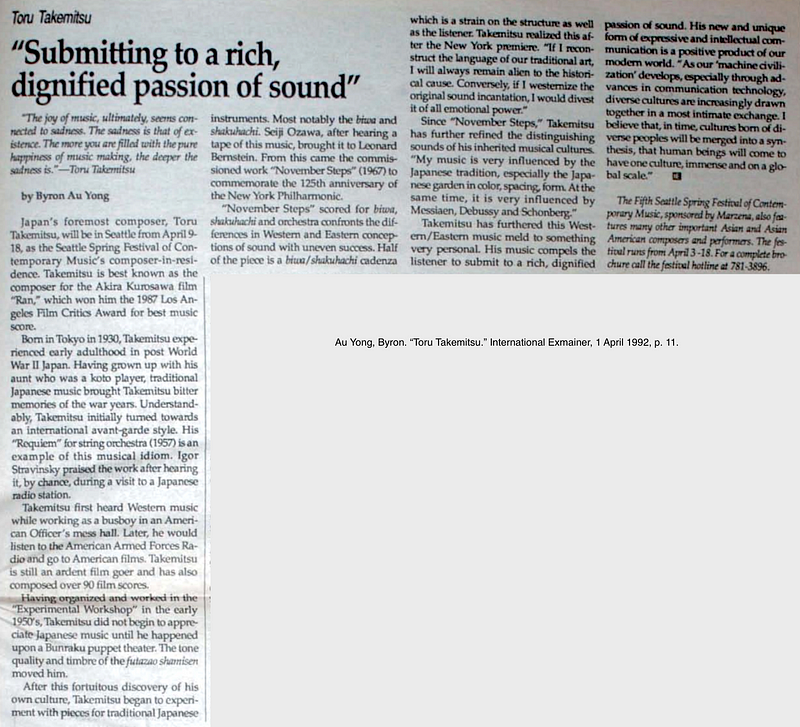Toru Takemitsu
“Submitting to a rich, dignified passion of sound.”

“The joy of music, ultimately, seems connected to sadness. The sadness is that of existence. The more you are filled with the pure happiness of music making, the deeper the sadness.” —Toru Takemitsu
Japan’s foremost composer, Toru Takemitsu, will be in Seattle from April 9–18, as the Seattle Spring Festival of Contemporary Music’s composer-in-residence. Takemitsu is best known as the composer for the Akira Kurasawa film Ran, which won him the 1987 Los Angeles Film Critics Award for best music score.
Born in Tokyo in 1930, Takemitsu experienced early adulthood in post World War II Japan. Having grown up with his aunt who was a koto player, traditional Japanese music brought Takemitsu bitter memories of the war years. Understandably, Takemitsu initially turned towards an international avant-garde style. His Requiem, for string orchestra (1957), is an example of this musical idiom. Igor Stravinsky praised the work after hearing it, by chance, during a visit to a Japanese radio station.
Takemitsu first heard Western music while working as a busboy in an American Officer’s mess hall. Later, he would listen to the American Armed Forces Radio and go to American films. Takemitsu is still an ardent film goer and has also composed over 90 film scores.
Having organized and worked in the ‘’Experimental Workshop” in the early 1950’s, Takemitsu did not begin to appreciate Japanese music until he happened upon a bunraku puppet theater. The lone quality and timbre of the futazao shamisen moved him. After this fortuitous discovery of his own culture, Takemitsu began to experiment with pieces for traditional Japanese instruments. Most notably the biwa and shakuhachi. Seiji Ozawa, after hearing a tape of this music, brought it to Leonard Bernstein. From this came the commissioned work November Steps (1967) to commemorate the 125th anniversary of the New York Philharmonic.
November Steps scored for biwa, shakuhachi and orchestra confronts the differences in Western and Eastern conceptions of sound with uneven success. Half of the piece is a biwa/shakuhachi cadenza which is a strain on the structure as well as lhe listener. Takemitsu realized this after the New York premiere. “If I reconstruct the language of our traditional art. I will always remain alien to the hislorical cause. Conversely, if I westernize the original sound incantation, I would divest it of all emotional power.”
Since November Steps, Takemitsu has further refined the distinguishing sounds of his inherited musical cultures. “My music is very influenced by the Japanese tradition, especially the Japanese garden in color, spacing, form. At the same time, it is very influenced by Messiaen, Debussy and Schoenberg.”
Takemitsu has furthered this Western/Eastern music meld to something very personal. His music compels the listener to submit to a rich, dignified passion of sound. His new and unique form of expressive and intellectual communication is a positive product of our modern world.
“As our ‘machine civilization’ develops, especially through advances in communication technology, diverse cultures are increasingly drawn together in a most intimate exchange. I believe that, in time, cultures born of diverse peoples will be merged into a synthesis, that human beings will come to have one culture, immense and on a global scale.”
The Fifth Seattle Spring Festival of Contemporary Music, sponsored by Marzena, also features many other important Asian and Asian American composers and performers. The festival runs from April 3–18. For a complete brochure call the festival hotline at 781–3896.
Original article published in the International Examiner, Vol. 19, № 7, on April 1, 1992, page 11. See IE Archives at iexaminer.org/archives
